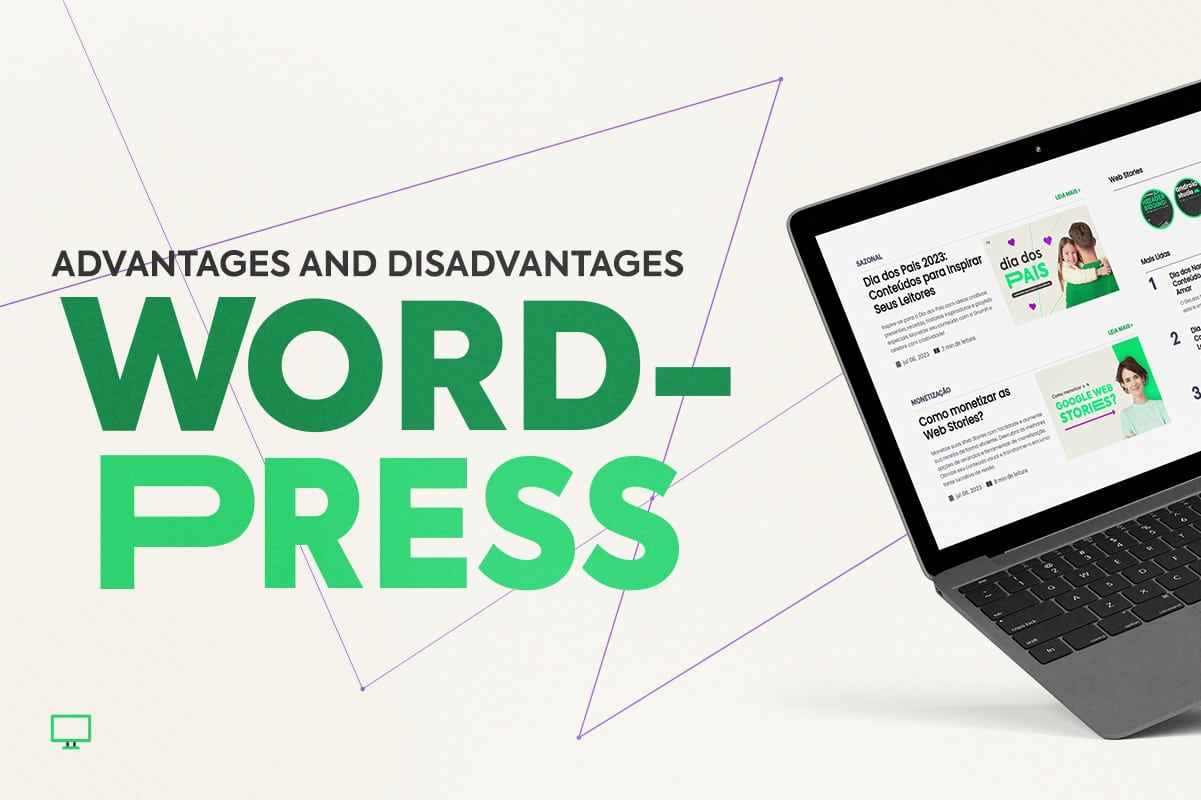If you’re already a Grumft ad partner, welcome to our blog. Otherwise, we hope this content motivates you to explore our unique programmatic solutions for publishers and advertisers. In this article, we’ll delve deep into the advantages and disadvantages of WordPress.
In this scenario, carefully evaluating the features of WordPress is essential to determine if it’s the right choice to meet your digital needs. Keep reading to learn more.
Index
The Meaning of a CMS Platform
CMS stands for Content Management System, a software open source that aims to make a publisher’s life more practical when creating, editing, and publishing online content. Websites hosted on a CMS platform offer exceptional convenience to users, as they don’t require other software for updates. This means you don’t need to be a computer expert to use it, making this solution increasingly popular. It’s important to note that the content management system goes beyond the realm of blogs, encompassing portals of various segments, from businesses of all sizes to e-commerce.
Details about WordPress
Developed in 2003 by Matt Mullenweg and Mike Little, WordPress is the result of the evolution of the existing b2/cafelog program. Version 1.0 was released in 2004, introducing the possibility for publishers to create their own user-friendly URLs. Since then, the moderator has had control over the configuration and approval of comments before they’re published on the blog. Today, WordPress is in constant evolution, and its latest version differs greatly from the original. The platform is based on PHP and MySQL, and is licensed under GPLv2.
Advantages and Disadvantages of WordPress
Get ready to gain a comprehensive overview of the advantages and disadvantages of WordPress to meet your website creation needs.
Advantages of WordPress
The size and popularity of WordPress are not accidental. It offers a series of benefits, including:
- Economy: WordPress is open source, meaning there are no costs for downloading or using the tool. The platform also offers free plugins and layouts. The only essential expenses are domain purchase and website hosting.
- Ease of Use: Extensive technological knowledge is not required to use WordPress, as it doesn’t require advanced configurations. This simplicity reduces site creation costs, eliminating the need to hire developers and designers.
- Speed: Your website can be online within minutes. After acquiring the domain and hosting, only two steps remain: choose the theme and layout that suit your segment, and add content. With a few clicks, you’ll be online, and updates can be done with just one click.
- Customization of Design: Regardless of the segment, WordPress offers a variety of free mockup options in various themes, from technology to gastronomy and e-commerce. Additionally, creative designs that can be edited and customized are available online.
- Functionality: In addition to basic functions, WordPress offers a wide range of plugins for various features, such as event organization, SEO, calendars, forms, and emails.
- Accessibility: Mobile device compatibility allows you to manage your account settings anywhere. Posting, editing, and adjusting page layout are possible actions on mobile devices.
Disadvantages of WordPress
Despite its popularity among publishers, the content management system is not without its drawbacks. It’s essential to consider them before deciding to use it:
- Security: WordPress’s popularity attracts hackers and spammers, making it susceptible to online attacks. Strict security measures are required to protect your domain. Use strong passwords, select plugins and themes carefully, and keep the platform updated.
- Updates: Regular updates are essential to maintain security, especially when many plugins are used. The system releases updates frequently, requiring daily revisions by site moderators.
- Cost of Plugins: Despite free plugins, expanding your site may require the purchase of paid extensions, whose prices vary depending on complexity and are generally in dollars.
Conclusions
In summary, WordPress should always be considered when creating or updating a website. Despite some disadvantages, we recommend this CMS due to its ease of implementation and frequent updates. The choice to use WordPress or not is entirely yours. Now that you understand the advantages and disadvantages, you’ll feel more confident in making your decision. And remember, rely on Grumft to guide you on this journey.




